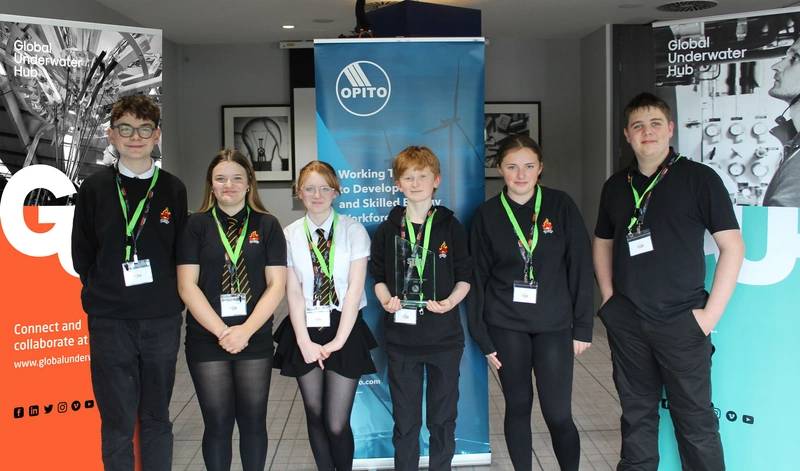Secondary school pupils from across the United Kingdom were in Aberdeen recently for the culmination of an annual nationwide competition organized by Global Underwater Hub. The young students were taking part in the final of the organization’s STEM Challenge competition, which tests the science, technology, engineering and mathematics (STEM) skills of 13 and 14-year-old pupils. The initiative tasks the youngsters to design, build, code, operate and market a small, wheeled model remotely operated vehicle (ROV) made using LEGO SPIKE sets that enable the development of programable mechanical robots using various LEGO parts.
It was a team of six from Millburn Academy in Inverness that beat their peers from five other schools across the country to lift the national title.
They faced opposition from pupils of:
- St Ninian’s High School in Giffnock near Glasgow
- Queen Ethelburga’s Collegiate in York
- Manchester’s Middleton Technology School
- Chilton Trinity School located in Bridgwater, Somerset, and
- St Oscar Romero Catholic School from Worthing in West Sussex.
Organized by Global Underwater Hub ((GUH) and delivered with the support of educational charity The Smallpeice Trust, STEM Challenge offers a platform for school pupils to apply their STEM knowledge, develop skills and discover how these can be used in their future careers. The program also demonstrates to the pupils and their teachers the breadth of career opportunities that are offered by companies working across the underwater industry.
To reach the final, each school won a regional heat where they competed against up to nine other schools. This year, heats were held in Inverness, Glasgow, Blyth, Manchester, Bristol and Southampton, and saw participation from over 320 pupils at nearly 50 schools, with some travelling significant distances to compete, such is the appeal of the initiative.
A panel of judges made up of individuals working in the underwater industry decided the winners. Along with marking the teams on the design and functionality of their creations, the judges also looked at how the pupils had worked together throughout the day, and the quality and delivery of their marketing presentations that concluded the competition.
As part of their trip to Aberdeen, the pupils and teachers had the opportunity to learn more about the different types of ROVs that are used by industry during a visit to the offices of leading Geo-data specialist Fugro. The visit gave them an opportunity to see ROVs up close and understand some of the technology that is involved in operating the systems.
During a tour of the ROV workshop they learned about how ROVs are constructed, maintained and used to deploy subsea intervention technologies. The pupils were also shown Fugro’s remote operations centre. Featuring advanced streaming technology, the centre allows onshore inspection engineers to visualise, command and control uncrewed surface vessels with eROVs miles away offshore.
The 2024 STEM Challenge program was sponsored by OPITO, Fugro, J+S Subsea, ORE Catapult, Subsea7, Subsea Innovation, Venterra Group and Viper Innovations.

